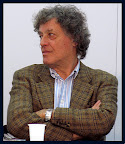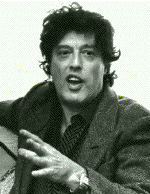|
2008 calendar Hamlet2.0
... new web2.0 toys
|

PoMo-Utopia Web-show Project : 2007
Stoppard bio
Stoppard Utopia
The Coast of Utopia (The Stoppard Trilogy) (Paperback)
by Tom Stoppard 96 pages
Publisher: Faber and Faber (August 5, 2002)
ISBN: 0571216633
stoppard.ru
... After Beckett [ some thr history in script analysis directory ]
My NOTES for production meetings (where?)
... Director's Notes @ shows.vtheatre.net/hamlet/webshow
... Stoppard & Stoppards -- dramaturgy notes "Beckett and Stopprad are Dead" (where?).
[ sample ]
Showcases :
RG.08 Master File :
"theatre w/anatoly" Stoppard's webpages:
• theatre theory -- filplus.org/thr/stopprad
• shows.vtheatre.net/hamlet/2008
• shows.vtheatre.net/hamlet/webshow
• pomo.vtheatre.net/stoppard
• forum/list --
• ... notes
• 10/7/2007 RG08 [ doc ]
To make "Director's Notebook" with Lulu?
Guide/WEB COMPANION to the play @ Amazon.com
• play
• writer
• cast
• crew
• show
... appendix
2009 --
...
|
Stoppard
2007-2008? ... t-blog
"postmodern" thoughts :
* several realities : Shakespeare (Hamlet) + Stoppard's 1968 + Present (2008)
* Three levels on stage : Pit + Stage + Stage on stage
* Juxtapositions of the worlds [ "transitions," Player's directing/conducting Stage Reality ]
... menu "Stoppard"?
[ notes @ groups.yahoo.com/group/vtheatre -- feed? ] see LINKS
stopprad [sum]
Gussow, Mel. "Happines, Chaos and Tom Stoppard." American Theatre Dec. 1995: 22+. Questia. 8 Dec. 2006 . biblio = theatre theory stoppard page.
....
Playgoers Eager For Homework: Must Be Stoppard Fans "The audience, as much as the play, is worth the price of admission as it wrestles at Lincoln Center with 'The Coast of Utopia,' Tom Stoppard’s beguilingly complex resurrection of Russia’s 19th-century intelligentsia. ... Between the acts, overheard snatches of audience dialogue burnished the evening as characters were plumbed or at least kept straight. 'Who was Alexander Herzen, precisely?' (Ah, the playwright’s tease: Come back for the next two parts to see Herzen dramatically intuit the terror of a revolutionary future.) 'I guess I’ll have to read Isaiah Berlin’s essays on these guys.' (Homework, gladly self-assigned, the ultimate compliment to Stoppard.)" The New York Times 11/30/06
NYT 2006

Tom Stoppard's "Rock 'n' Roll"
Radio Prague
June 28, 2006
http://www.radio.cz/en/article/80581
Tom Stoppard, one of the greatest living playwrights, has written a new play called Rock 'n' Roll and it includes some serious Czech content. Set in two locations—Prague and Cambridge—the scenes shift from those taking place in Czechoslovakia between 1968 and 1989, to those in England which revolve around the family of an academic Marxist, Max Morrow. The connecting point is a Czech student studying at Cambridge, Jan, who falls in love with Max's daughter. Described as a tragicomic family saga intertwined with a political drama set in Normalization-era Czechoslovakia, Rock 'n' Roll also features lots of rock music, including songs by the Czech band, The Plastic People of the Universe.
A portion of the cast of Rock 'n' Roll London, 13 June 2006, photo: Patricia Grant A portion of the cast of Rock 'n' Roll London, 13 June 2006, photo: Patricia Grant [http://www.aboutrufus.com/rocknroll.htm]
Paul Wilson is a former member of the band—though he's better known for his English-language translations of Vaclav Havel's texts, than for his days as a rocker. He was at the June 14th premier of Rock 'n' Roll and told me about the atmosphere at London's Royal Court Theatre on opening night:
Paul Wilson Paul Wilson
"It was very exciting. There were people milling around outside before the performance—there was Ivan Jirous, Pavel Zajicek, and Zdena Tominova who is an old Chartist, and various friends, my wife Patricia, and Tom Stoppard. We were all kind of milling around and then a limousine pulls up and Havel steps out, and whenever Havel arrives anywhere there is always a great rush of photographers and hangers-on and so on, so it was quite an excited arrival. Then we all went downstairs to the bar, and the Czech embassy hosted a reception for Vaclav Havel at which Mick Jagger showed up. And not only Mick Jagger, but David Gilmour of Pink Floyd, and there were quite a few other
luminaries around, so it was quite an exciting time."
It definitely sounds like the who's who of London society and Czech society was there. Tom Stoppard's new play is dedicated to Vaclav Havel. What do you think Havel's reactions were to Rock 'n' Roll?
Tom Stoppard and Ivan Jirous at the Royal Court Theatre, London, 14 June 2006, photo: Paul Wilson Tom Stoppard and Ivan Jirous at the Royal Court Theatre, London, 14 June 2006, photo: Paul Wilson
"Well, I know what his reaction is because I actually translated an interview that he gave to two British newspapers, The Independent and The Telegraph. He said that he had read it twice in Czech and had then seen the performance in English, and he was quite astonished by the level of sophistication with which Stoppard treated the material. Tom Stoppard is Czech by origin, but he never lived in Czechoslovakia. They had a discussion about which of the characters is Havel, and of course there is an old Marxist who obviously isn't Havel, but there is a young man who represents the kind of Prague underground, and then there is another young man called Ferda, who is named after Ferdinand Vanek from Havel's plays. Ferda occasionally represents Havel's point of view, but Havel's point of view is also represented by other characters—as Tom Stoppard pointed out in one of his interjections during these interviews, it wasn't just Ferda who was like Havel, but many others as well. So Havel was, I think, quite impressed with the play, and certainly enjoyed it. It's very entertaining as well as very enlightening."
Tom Stoppard and Vaclav Havel, photo: Paul Wilson Tom Stoppard and Vaclav Havel, photo: Paul Wilson
Czech critics have made much of the fact that there is a Havel-like character—or characters—in the play, and another character who seems to resemble Milan Kundera. Did you pick this up?
"The way Stoppard wrote the play was that he did research in the various discussions and controversies that Vaclav Havel was involved in during the late 1960s and early 1970s. So in one speech, the two characters, Ferda and Jan (the young Czech rock fan who later becomes a prisoner of conscience) have a debate about the nature of the invasion [of 1968] and the consequences of the invasion. This debate is in essence the debate that Havel had with Kundera, and Kundera is only represented in that one particular instance."
Mick Jagger with Vaclav Havel and Dagmar Havlova Royal Court Theatre, London, 14 June 2006, photo: Paul Wilson Mick Jagger with Vaclav Havel and Dagmar Havlova Royal Court Theatre, London, 14 June 2006, photo: Paul Wilson
"There is another conversation on the nature of heroism, and Jan says 'I don't want to go to jail, I'm afraid of going to jail, I don't want to be a hero,' and this reflects the controversy that the Chartists had. Havel had a public debate with Ludvik Vaculik and Petr Pithart about the nature of heroism in the dissident community, and this is reflected in the play. So what Stoppard has done is that he's taken various real debates that went on at the time and he's boiled them down and put them in the mouths of his two main Czech characters."
Now there is another element to Tom Stoppard's new play, and that is the inclusion of an underground rock band called The Plastic People of the Universe. You sang with the Plastics in the 1970s—did Tom Stoppard consult with you about the content of the story while he was writing the play?
Harold Pinter and Vaclav Havel, Royal Court Theatre, London, 18 June 2006, photo: Paul Wilson Harold Pinter and Vaclav Havel, Royal Court Theatre, London, 18 June 2006, photo: Paul Wilson
"Yes, he did. He consulted with me and he also spent a lot of time talking to Jaroslav Riedl, who is the top Czech historian of the underground. Stoppard asked a lot very specific questions about how the underground scene unfolded. What is mainly represented in the play is the coming together of these two currents—that is, the cultural opposition represented by The Plastic People of the Universe and the other bands around them, and the intellectual opposition represented by Vaclav Havel and other writers. What he's done is try to explain through the course of the play how the intellectual opposition gradually came to realize the importance of this cultural opposition in political terms. Of course they have a debate about whether or not it's politics or art, and that again represents a discussion that Havel once had with Ivan Jirous and Milan Hlavsa, who insisted that there was nothing political about the Plastic People. Havel's position was that it doesn't matter whether they think the band is political or not, that the important thing is that any authentic expression in that regime—in that system—automatically becomes political.
http://www.nytimes.com/2006/11/30/opinion/30thu3.html?_r=1&oref=slogin [ru]
Spring 2008 : Stoppard -- R/G are Dead
stoppard.ru.html page
... Director’s Thoughts about Sir Tom and his Writing
"All that is straight lies," the dwarf murmured contemptuously. "All truth is crooked; time itself is a circle." Friedrich Nietzsche, Thus Spoke Zarathustra
Postmodernism is old, but Americans still do not know what PoMo is, even though they’ve already had two post modern presidents. When students ask me about the postmodern, I tell them to read "Rosencrantz and Guildenstern are Dead". First written in 1964, then re-written in 1966 and 68, Tom Stoppard, “dove into the world's most famous play, Hamlet, and retold it from the point of view of two bumbling support players. The entire world is a stage, and Rosencrantz and Guildenstern play their part, finding themselves unwitting pawns in history's greatest tragedy (was written about the 1990 movie based on the play and directed by Stoppard himself)”.
This play is a “pastiche” of Shakespeare and Beckett and represents the game of the present with the past, when the present has no plans for future -- Rosencrantz and Guildenstern as two characters in "Waiting for Godot" do not understand the world no matter how hard they try to think about life.
A darling of college stage, the script has it all, the good and bad of modern theatre (witty language and weak plot). "Comedy about Tragedy" is how I define the genre for myself.
For Lev Tolstoy, all of Shakespeare was nonsensical for Rosencrantz and Guildenstern, the action makes no sense {What do you mean by nonsense and why doesn’t the action make sense?} And what about life for Stoppard? Or for me... all nonsense? Oh, this is perhaps, the most dramatic (absurd and thus tragic?) part of "to be and not to be"!
Free will and destiny ? -- no, we are afraid of classic dictionary! Our heroes avoid decisions.
... is it about us?
You bet.
Re-read Hamlet... and then you would see this play as never ending dialogue about ouselves.
script.vtheatre.net/stoppard
http://www.sff.net/people/mberry/stoppard.htp
http://theater2.nytimes.com/2006/11/28/theater/reviews/28coas.html NYTimes review

